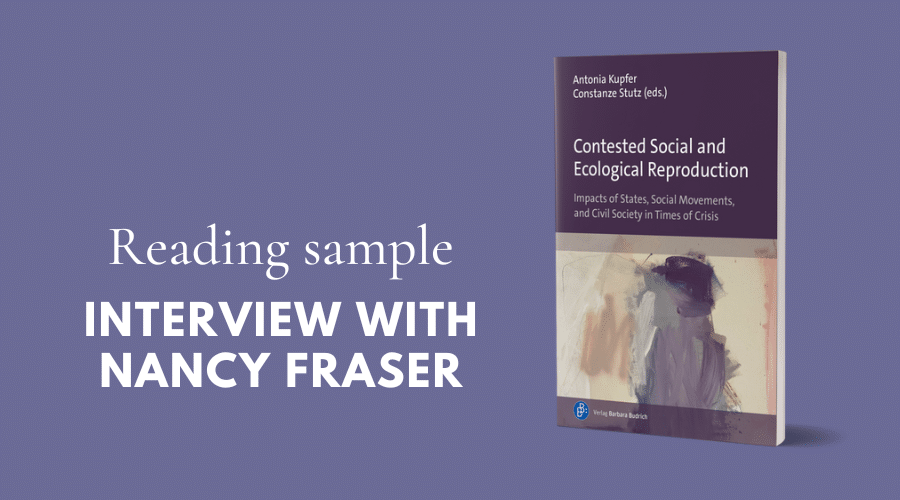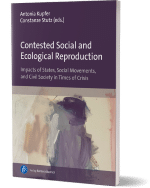Reading sample from Contested Social and Ecological Reproduction. Impacts of States, Social Movements, and Civil Society in Times of Crisis edited by Antonia Kupfer and Constanze Stutz. Read a snippet from the interview with Nancy Fraser.
Capitalism is Devouring Livelihoods – A Call for Counter Hegemony
Interview with Nancy Fraser
Antonia Kupfer: Tonight we are delighted to have the opportunity to learn directly about your just-published book, “Cannibal Capitalism”, published by Verso. Your book starts with an argument, “Why we need to expand our conception of capitalism.” I wanted to ask you to explain this further and why you see this argument as relevant, especially now, given that there is already a decade-long eco-feminist tradition in movements in the Global South and also North that has revealed capitalism’s dependence on nature and unpaid care work.
Nancy Fraser: Let me just start first with “why now?” I do think we’re in a situation of real urgency. I would describe the situation as a very acute multidimensional crisis, in which we have an ecological crisis entwined with a crisis of care or social reproduction. A political crisis. A crisis of democracy, if you like. A crisis of work and livelihood and, in general, the economy not working for the mass of human beings on the planet. To my mind, this is a rare kind of crisis. It’s what historians have called a general crisis, meaning it’s not sectoral. It’s not that one sector of the society is in crisis, but it’s the whole social order, the whole order of civilization, if you like. And those kinds of crises come along only rarely. I would say that in the 500 years or so of capitalism’s history, we’ve had at most three or four such crises. The 1930s would be the most recent one. I suppose that the ecological dimension gives us a sense that this crisis might even be more – more consequential, more threatening – than even the crisis of the 1930s, which was already a big deal, because of the threat to the planet and to life on it, including but not only human life.
My first thought is where do we see social forces in society that are at least potentially capable of rising to the occasion and taking responsibility for getting us out of this mess? I don’t think the elites and the established political parties, or the corporate powers, are or can be counted on for that. On the contrary, in most cases they are forces that make things worse. I’m looking around to see who and where and how we might generate a response to this and I would say that there’s a great deal of social agitation and mobilization, which is either already plainly progressive and emancipatory or at least potentially so. But this mobilization, activation, engagement is very dispersed and very fragmented. It doesn’t accumulate. It doesn’t rise to the level of, using Gramsci’s language, a counter hegemonic bloc. A social force that could present itself as a right, espousing an alternative form of social life and credibly presenting itself as actually having the vision and the breadth, the heft power, to implement such a vision.
I would say that right now, the scale of the crisis is dramatically larger than the scale of the forces that could resolve it in an emancipatory dimension. And it seems to me that what we want or what I feel a need for is a perspective that is able to trace all the various dimensions of this multiple crisis to one and the same social system. I believe that it is not accidental that ecology happens to be going bad at the same time that democracy is collapsing, at the same time that social reproduction is threatened. I don’t think this is just some multiplicity of bad things happening in a more or less accidental way. I think that it’s systemic and I think it’s about the unravelling of the form of capitalist society that has been entrenched on a global scale for the last 40 years – namely neoliberal capitalism – that was supposed to resolve the crisis of the earlier form of social democratic capitalism. And we can argue about how well it did or didn’t resolve that. I don’t think it did very well. But in any case, it is now about unravelling the neoliberal regime of capitalism.
I have a sort of a political intuition that it would be useful to have a perspective that in a sense demonstrated why various social movements – each of which has maybe its own paramount issue, which differs from the paramount issue of other movements – why they all are grounded systemically in one and the same social system, and why all of them need to cooperate to transform that system. That’s the political intuition. The theoretical intuition is that our received critical theories of capitalism, while very insightful in one aspect or another, are not yet adequate to give us that kind of perspective of how the multiplicity of crisis strands are entangled and exacerbating one another.
My thought is that the received views of capitalism are too economistic. They understand capitalism as an economic system that is premised on commodity production in for-profit enterprises, based on free wage labour market exchange, competitive firms, and so on and so forth. Now, that’s not wrong. It’s just that there’s a lot more going on. The kinds of issues we need to understand, I think, is what is the relation between that economic aspect of the society, which is real and powerful, and what is the relation between it and nature? What is the relation between production and social reproduction? What is the relation between the market and the state or other forms of public power? What is the relation between commodities and public goods?
For a long time, I’ve been trying to argue that the capitalist economy depends on non-economic background conditions. You don’t have wage labour if you don’t have first people doing reproductive work or care work to maintain, nurture, birth and socialize and care for the labour force and replenish it. Second, you don’t have commodity production without energy, without so-called raw materials, without all the natural inputs, and without the general environmental conditions that we all rely on. And the economy relies on breathable air, potable water, relatively stable sea levels, climate, etc. That’s all a necessary background condition. Third, there are also public powers and public goods. You don’t have a capitalist economy without legal systems that guarantee property rights. Without police armies, repressive forces that maintain order and put down dissent.
Without regulatory capacities that restrain capital “for its own good”. Kind of like Ulysses tied me to the mast so I don’t jump over and dash myself against the rocks. So public power and public goods, all those things – infrastructure and so on – all the things that the market and private-profit-oriented production cannot supply: that’s a third necessary condition.
And there’s a fourth one as well, which I think of as the underside of exploited wage labour. Exploited wage labour is supposed to be done by free workers who are citizens, who have rights, who have access to the courts, who can call on states to protect them and maintain their rights, and who are paid. Not gloriously by any means, but for their living costs, the cost of their reproduction. That’s Marx’s idea of exploitation: the capitalist gets the surplus, the worker gets paid for the hours that are necessary to produce the worker’s own means of living. My idea, and it’s not unique to me, is that that all rests on another form of labour that is less pleasant, and that capitalism doesn’t want to acknowledge, and that we try to look away from: that is unfree or semi-free or dependent labour of those who do not have actionable rights, are not able to call on state protection to vindicate their rights. A classic example would be migrants. The most extreme case would be migrants without papers. But even migrants with papers have only a kind of conditional right to be a resident on the territory and to work on the territory. And they are easily deportable in a way that native-born citizen workers are not. Their rights are compromised.
Then, of course, there are also racialized minorities, with the United States being an obvious case, in which especially African Americans, but other people of colour as well, indigenous peoples, have a very hard time really claiming the status of being a free citizen worker and therefore are not able to command a wage that covers their full living costs. They are paid less than the cost of living, less than the necessary labour hours in the Marxian view. They are expropriated, as opposed to exploited. That’s the terminology I use. The profitability of exploited labour depends on the availability of expropriated or expropriate labour, and that’s a division – exploited, expropriated – that corresponds roughly but unmistakably to what W.E.B. Du Bois called “the global colour line”.
In a nutshell, I’m trying to make visible what underpins the supposedly phenomenal productivity and wealth-generating capacity of the capitalist economy. What underpins it is a huge amount of unpaid costs, forms of social wealth that capital helps itself to and takes no responsibility for replenishing or reproducing: nature, care, expropriated labour – especially of people of colour – and public goods or public powers, state capacities. Capital depends on all these things. It, you could say, free rides on them. It helps itself to them and it disavows any obligation to replenish what it takes or to repair what it damages. To me, that’s a formula for disaster.
The title of my book is “Cannibal Capitalism”. What I’ve just described is a dynamic, a tendency for the capitalist economy to cannibalize its own underpinnings, which are, of course, also the underpinnings and substance of our lives. We are, in a sense, the main course in capital’s binge eating, so to speak. This is an expanded view of what capitalism is. It puts the emphasis on the cannibalizing relation between the foreground economy and the background non-economic conditions of our lives. And I think it gives us a way to see why the ecological aspect of our crisis and the social reproductive aspect of our crisis and the political aspect and the racial injustice aspect, the imperial aspect, why all of those are grounded in one and the same social system. And my hope is that that’s a perspective that could help inform our understanding and make more vivid, more appealing, more necessary the sense of the need to scale up emancipatory engagement to really try to think in Gramscian terms about building a counter hegemony.
Constanze Stutz: I would like to go on a bit further on the contradictions of social reproduction. In your book, you argue that no society, capitalist or otherwise, that systematically cannibalizes social reproduction can endure for very long. And yet right now, in capitalist societies, there is a key contradiction regarding social reproduction. On the one hand, social reproduction is a necessary condition for sustained capital accumulation. On the other hand, capitalism’s striving towards unlimited accumulation leads to it cannibalizing, as you argue, the very social reproduction activities on which it relies. Under financialized capitalism, this embedded social contradiction results in a major crisis of social reproduction and care, as we are seeing right now.
***
Would you like to continue reading?
Order “Contested Social and Ecological Reproduction” in our shop or download as open access
Contested Social and Ecological Reproduction.
Impacts of States, Social Movements, and Civil Society in Times of Crisis
edited by Antonia Kupfer and Constanze Stutz
About “Contested Social and Ecological Reproduction”
Humanity has not succeeded in securing the basis of life for all people. A major reason is the dominant global capitalist economy, which is based on the exploitation and use of nature—but this state of affairs is not accepted by everyone. This book provides a close socio-analytical look at how states, social movements, and civil society actors deal with this polycrisis.
Any questions? Get in touch.


